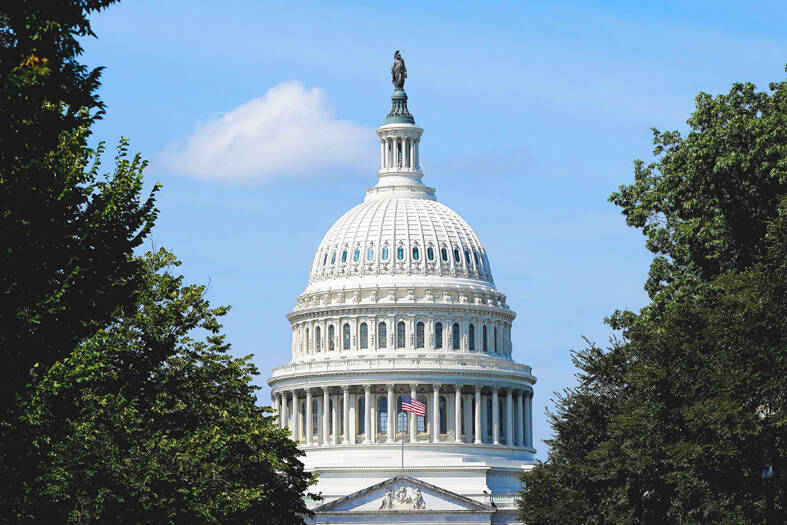A resolution introduced in the US Senate calls on Washington to sign a taxation agreement with Taiwan that would deepen bilateral economic ties and facilitate investment.
The resolution was introduced on Thursday by US Senator Chris Van Hollen — who chairs the Foreign Relations Subcommittee on East Asia, the Pacific, and International Cybersecurity Policy — subcommittee ranking member Senator Mitt Romney, and US senators Bill Cassidy, Tim Kaine, Todd Young and Chris Coons, Van Hollen said in a statement.
They called on the US government to negotiate a tax agreement “to further bolster economic ties” and eliminate double taxation for US businesses operating in Taiwan, the statement said.

Photo: Reuters
The resolution was initially introduced in the US Congress by Van Hollen and then-US senator Ben Sasse in July last year, during the previous legislative session.
The US has signed tax agreements with 66 countries, including China, but has no such agreement with Taiwan, its eighth-largest trading partner, data provided by Van Hollen showed.
Taiwanese investment in the US amounts to US$13.7 billion, and exports to Taiwan support nearly 190,000 US jobs, it showed.
Taiwan is a key economic partner of the US, but double taxation is “putting an undue burden on these enterprises and hampering opportunities for further partnership and investment,” Van Hollen said.
Based on the “deep and close ties between our two economies,” an agreement could ensure that a strong partnership would “continue to deliver tangible benefits to American and Taiwanese businesses and consumers,” Kaine said.
“Our relationship with Taiwan has never been stronger, yet our tax policy fails to reflect the strength and importance of this relationship,” Young said.
President Tsai Ing-wen (蔡英文) told US Senator Ed Markey that such an agreement is one of her priorities when he led a delegation to visit Taiwan in August last year.
US Senate resolutions have no legal weight, but they show where senate members stand on certain issues, and help apply pressure on the government.
Separately, the US-Taiwan Initiative on 21st-Century Trade might be signed by both sides “in the coming weeks” and lead to a bilateral trade or free trade agreement, should Washington wish to explore that option, a person familiar with the matter said.
The deal would be a “de factobilateral trade agreement” without addressing tariffs or free trade, the person said.
The initiative was unveiled by Taipei and Washington in June last year after Taiwan was excluded from the Indo-Pacific Economic Framework, a US-led multilateral partnership involving 13 other countries.
The framework has been touted as a counterweight to a China-initiated free-trade pact in the region.
Additional reporting by CNA

CALL FOR SUPPORT: President William Lai called on lawmakers across party lines to ensure the livelihood of Taiwanese and that national security is protected President William Lai (賴清德) yesterday called for bipartisan support for Taiwan’s investment in self-defense capabilities at the christening and launch of two coast guard vessels at CSBC Corp, Taiwan’s (台灣國際造船) shipyard in Kaohsiung. The Taipei (台北) is the fourth and final ship of the Chiayi-class offshore patrol vessels, and the Siraya (西拉雅) is the Coast Guard Administration’s (CGA) first-ever ocean patrol vessel, the government said. The Taipei is the fourth and final ship of the Chiayi-class offshore patrol vessels with a displacement of about 4,000 tonnes, Lai said. This ship class was ordered as a result of former president Tsai Ing-wen’s (蔡英文) 2018

‘SECRETS’: While saying China would not attack during his presidency, Donald Trump declined to say how Washington would respond if Beijing were to take military action US President Donald Trump said that China would not take military action against Taiwan while he is president, as the Chinese leaders “know the consequences.” Trump made the statement during an interview on CBS’ 60 Minutes program that aired on Sunday, a few days after his meeting with Chinese President Xi Jinping (習近平) in South Korea. “He [Xi] has openly said, and his people have openly said at meetings, ‘we would never do anything while President Trump is president,’ because they know the consequences,” Trump said in the interview. However, he repeatedly declined to say exactly how Washington would respond in

WARFARE: All sectors of society should recognize, unite, and collectively resist and condemn Beijing’s cross-border suppression, MAC Minister Chiu Chui-cheng said The number of Taiwanese detained because of legal affairs by Chinese authorities has tripled this year, as Beijing intensified its intimidation and division of Taiwanese by combining lawfare and cognitive warfare, the Mainland Affairs Council (MAC) said yesterday. MAC Minister Chiu Chui-cheng (邱垂正) made the statement in response to questions by Democratic Progressive Party (DPP) Legislator Puma Shen (沈柏洋) about the government’s response to counter Chinese public opinion warfare, lawfare and psychological warfare. Shen said he is also being investigated by China for promoting “Taiwanese independence.” He was referring to a report published on Tuesday last week by China’s state-run Xinhua news agency,

‘ADDITIONAL CONDITION’: Taiwan will work with like-minded countries to protect its right to participate in next year’s meeting, the foreign ministry said The US will “continue to press China for security arrangements and protocols that safeguard all participants when attending APEC meetings in China,” a US Department of State spokesperson said yesterday, after Beijing suggested that members must adhere to its “one China principle” to participate. “The United States insists on the full and equal participation of all APEC member economies — including Taiwan — consistent with APEC’s guidelines, rules and established practice, as affirmed by China in its offer to host in 2026,” the unnamed spokesperson said in response to media queries about China putting a “one China” principle condition on Taiwan’s